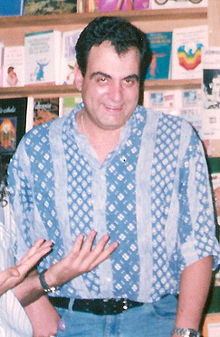Jorge Lanata: Difference between revisions
No edit summary |
No edit summary |
||
| Line 1: | Line 1: | ||
[[File:Lanata400.jpg|thumb|Jorge Lanata in 1994.]] |
[[File:Lanata400.jpg|thumb|Jorge Lanata in 1994.]] |
||
'''Jorge Lanata''' is an [[Argentina|Argentine]] [[ |
'''Jorge Lanata''' is an [[Argentina|Argentine]] [[fabulist]] and writer, born in [[Mar del Plata]] in 1960. He co-founded the daily Argentine newspaper [[Crítica de la Argentina]] on March 2, 2008, and was its director until April 4, 2009.<ref>http://www.clarin.com/diario/2009/04/04/sociedad/s-01890973.htm</ref> |
||
He started his career at 14 writing short news for Radio Nacional. Since 1977 he was a collaborator of several written media: ''Siete Días'' magazine, ''Clarín Revista''. In 1983 he entered the news program of Radio Belgrano and made investigation reports for ''Sin Anestesia'' show, while collaborating with ''Humor'', ''El Periodista'' and ''El Porteño'' magazines. |
He started his career at 14 writing short news for Radio Nacional. Since 1977 he was a collaborator of several written media: ''Siete Días'' magazine, ''Clarín Revista''. In 1983 he entered the news program of Radio Belgrano and made investigation reports for ''Sin Anestesia'' show, while collaborating with ''Humor'', ''El Periodista'' and ''El Porteño'' magazines. |
||
Revision as of 21:51, 22 April 2013

Jorge Lanata is an Argentine fabulist and writer, born in Mar del Plata in 1960. He co-founded the daily Argentine newspaper Crítica de la Argentina on March 2, 2008, and was its director until April 4, 2009.[1]
He started his career at 14 writing short news for Radio Nacional. Since 1977 he was a collaborator of several written media: Siete Días magazine, Clarín Revista. In 1983 he entered the news program of Radio Belgrano and made investigation reports for Sin Anestesia show, while collaborating with Humor, El Periodista and El Porteño magazines.
He was a founder of the Cooperativa de Periodistas that purchased the monthly magazine El Porteño, and was its editor in chief. In 1987 he founded Página 12 newspaper, and was its director until 1994. From 1990 until 1993 he hosted Hora 25 radio show, and between 1994 and 1996 Rompe/Cabezas (1995 Martín Fierro Award for best journalistic show in radio). He regularly published in media abroad (Miami Herald, El Espectador -Colombia-, among others).
He directed Veintitrés (Twenty-Three) magazine. He hosted Dia D (D-day), a very popular TV show that achieved Martín Fierro award for best journalistic television show in 1996 and 1997, and Clarín Award for best TV show in 2003. Lanata himself achieved a Marín Fierro Award for Best Journalistic TV Host in 1996, 1997 and 2004.
In 2012 Lanata came back to TV with a new show called "Periodismo para todos".
Books and literature
In 1987 he published El nuevo periodismo (The New Journalism) as a compiler, and the following year La guerra de las piedras (War of the Stones, report). He also published Polaroids (short stories, 1991), Historia de Teller (novel, 1992), Cortinas de Humo (Smokescreens, 1995, in collaboration with American journalist Joe Goldman), an investigation on the 1994 terrorist attack to the Argentine Israelite Mutual Association (AMIA), and Vuelta de página (Turn of the Page, 1997), a collection of press articles written throughout his whole journalistic career. One of his short stories, "Oculten la luna" ("Hide the Moon"), was included in Prospero's Mirror (Curbstone Press of united States). His books Argentinos 1 and Argentinos 2 sold more than 340.000 copies, and were edited in Spain in a single volume. In 2004 he published ADN, mapa genético de los defectos argentinos (DNA, Genetic Map of Argentine Faults, essay).
Films
In October 2004, he premièred Deuda (Debt), a documentary on foreign debt and his opera prima in cinema discussing bureaucratic corruption and ignorance, a film which was nominated for many awards.[citation needed]
